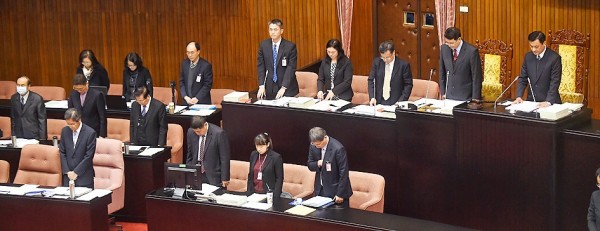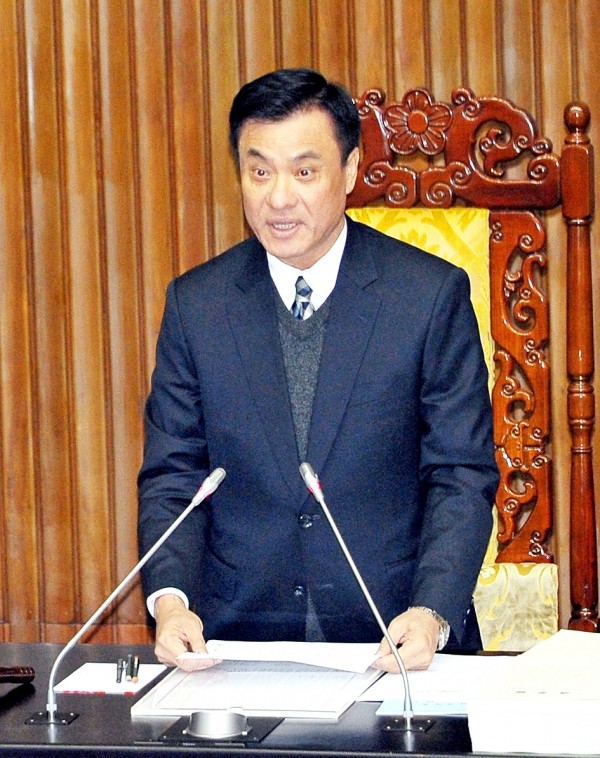《TAIPEI TIMES 焦點》 KMT blocks ill-gotten party assets bill

Legislative Speaker Su Jia-chyuan, right, back row, Premier Simon Chang, left, front row, and lawmakers observe a moment of silence in the legislature in Taipei yesterday to pay tribute to the victims of the Feb. 6 earthquake in Tainan. Photo: Liu Hsin-de, Taipei Times
FAIR PLAYING FIELD: DPP lawmakers said the KMT had not learned anything from its electoral routs, while the KMT said the DPP’s transition bill was unconstitutional
By Alison Hsiao / Staff reporter
The new legislative plenary session opened yesterday, with the Chinese Nationalist Party (KMT), reduced to a minority party after its election rout, blocking draft bills on “ill-gotten party assets” proposed by the Democratic Progressive Party.
The session commenced with Legislative Speaker Su Jia-chyuan (蘇嘉全) leading the legislature and Executive Yuan officials in observing a moment of silence for those who lost their lives in Tainan in the earthquake that struck on Feb. 6.
More than 100 draft acts sailed through their first readings and were referred to legislative committees for review and deliberation during the morning meeting, including draft bills on governing political parties; amendments to the Referendum Act (公民投票法) and the Disaster Prevention and Protection Act (災害防救法); setting up reciprocal offices with China; and the much-discussed legislation on the presidential transition of power.
What did not get through were four bills aiming to deal with ill-gotten party assets proposed by DPP lawmakers, which the KMT caucus opposed and were sent back to the Procedure Committee.
KMT caucus whip Lin Te-fu (林德福) said the regulation of political parties’ assets could be included in the proposed political party act, adding that the KMT opposed the DPP’s bills because they are “apparently targeting [the KMT].”
DPP Legislator Su Chih-fen (蘇治芬) blasted the KMT’s move on Facebook, saying the KMT “still does not understand why it has been spurned by the public even after its 2014 and 2016 electoral routs.”
“The political party act is to ensure a fair playing field for all political parties, and the premise for that fairness depends on the act governing ill-gotten party assets stripping away the competitive advantage that the KMT has held for a long time,” Su Chih-fen said.
The DPP, which now holds a majority in the legislature, can choose to counteract the KMT’s move if it is “determined to propose the bill,” Social Democratic Party spokesperson Miao Po-ya (苗博雅) said, adding that according to legislative regulations, a caucus can only block the referral of a bill to a committee when “there are too few lawmakers present to conduct a vote.”
“In other words, if the DPP appoints a sufficient number of lawmakers to attend the first-reading meeting ... the bills could be successfully referred to the committee for review,” Miao added.
Meanwhile, Lin said prior to the general assembly meeting that the KMT caucus does not and would not oppose legislation on the transition of power, but the legislation must not be unconstitutional.
The draft act will not be reviewed until at least the end of next month or the beginning of April after a question-and-answer session, “so the third reading will probably be completed only after the [May 20] presidential transition,” he said.
“Since the proposed bill will not be in effect for this transition, we should take time to review the bill. The most important thing is not to ensure that it does not go against the Constitution, as the version proposed by [the DPP] does in some parts,” Lin added.
KMT Legislator Alicia Wang (王育敏) said the DPP’s version of the legislation, which would restrict the incumbent president’s appointment and decisionmaking powers, would generate controversies, and that since a president is elected to a full four-year term, resigning before their time is up or reducing their effective ruling time is unlawful.
DPP Legislator Wu Ping-jui (吳秉叡) disagreed, asking why “the KMT, when it proposed its version of the presidential transition bill in 2008, which was little different from the one we have now, did it not find it unconstitutional?”
新聞來源:TAIPEI TIMES

Legislative Speaker Su Jia-chyuan presides over the legislature on the first day of the legislative session that opened yesterday in Taipei. Photo: CNA



















